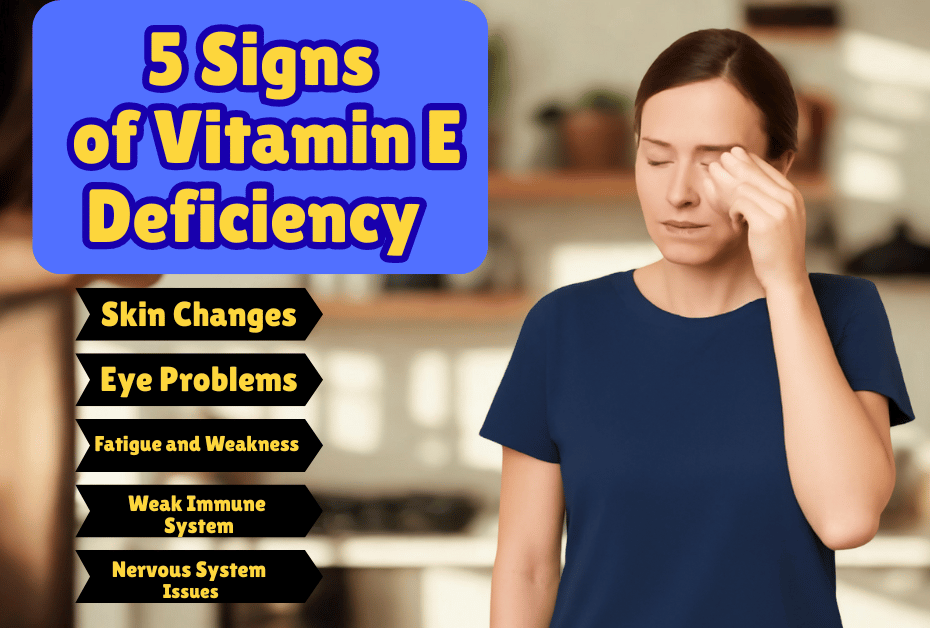5 Signs Your Body is Lacking Vitamin E, and Why You Should Call Your Doctor Immediately

Vitamin E is an important antioxidant that protects cells from harm in our bodies. It is essential for keeping skin, eyes, and the immune system healthy. Despite being uncommon, a lack of vitamin E can lead to various health issues if left untreated. This article will discuss five signs of vitamin E deficiency and why you should see a doctor if you have any of them.
1. Changes in the Skin
Visible skin changes are one of the first signs of vitamin E deficiency. A deficiency of vitamin E could be to blame if your skin feels dry or harsh or even loses its natural radiance. This nutrient is important for keeping the skin hydrated, protecting it from free radicals, and overall skin health. You might also see more acne or other skin problems. If these skin problems don’t go away, it’s a clear sign that your vitamin E levels may be low.
2. Eye Problems
Vitamin E is essential for keeping the eyes safe from oxidative damage. Your eyes may hurt if you don’t get enough vitamin E. They may get red, itchy, or feel dry. Over time, a long-term lack of this antioxidant could potentially make your vision worse, making things look blurry or less sharp. If you see any of these indicators, you should get your vitamin E levels evaluated right away to avoid long-term damage.
3. Fatigue and Weakness
A lack of vitamin E can also cause constant tiredness and weakness that can’t be explained. Vitamin E helps move oxygen to cells and keeps your energy levels up all day. Not enough vitamin E can make you tired and weak, as your cells won’t work properly. If you’re more tired than usual, your body may need more of this vital nutrient.
4. Weak Immune System
A healthy immune system needs vitamin E. It boosts the body’s ability to fight off infections by making white blood cells stronger. You can get sick more often or have a harder time getting better if your body doesn’t have enough vitamin E. Monitoring your vitamin E intake is crucial as a weakened immune system increases your susceptibility to colds, the flu, and other diseases.
5. Nervous System Issues
A lack of vitamin E might also hurt your neurological system. You need this vitamin to keep your nerve cells healthy. Vitamin E deficiency can cause damage to your nerves. You might feel tingling, numbness, or “pins and needles” in your arms and legs, as well as have trouble keeping your equilibrium. In very bad situations, not getting enough vitamin E might make it hard to walk or move in a coordinated way. You should never ignore these symptoms, and you should always see a doctor.
Causes of Vitamin E Deficiency: There are a number of things that can lead to a lack of Vitamin E, including
- Bad diet
- Fat malabsorption (which happens a lot with digestive problems)
- Medical problems such liver problems, cystic fibrosis, or long-term disorders
- Stress and being physically tired
How to Treat a Lack of Vitamin E: If you have any of the symptoms listed above, you should see a doctor to get the right diagnosis and treatment. People commonly deal with a lack of vitamin E by changing their diets and taking vitamin E supplements. Foods that have a lot of Vitamin E are:
Almonds, sunflower seeds, and hazelnuts are examples of nuts and seeds.
Vegetables with green leaves, like broccoli, spinach, and kale
Oils from plants, including olive oil and sunflower oil
Salmon and tuna are examples of fatty fish.
Your doctor may suggest taking vitamin E supplements to help get your body’s levels back to normal in some circumstances.
Conclusion:
A vitamin E deficiency can lead to serious health issues if left untreated. If you have any of the symptoms listed above, you should call your doctor right away to get a correct diagnosis and treatment plan. You can keep your body and immune system robust and healthy by eating a balanced diet that is high in vitamin E and getting medical help when you need it.
Also Read:
Are You Doing These 10 Harmful Things? Protect Your Kidneys Today